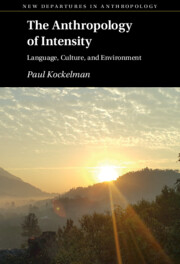Book contents
- The Anthropology of Intensity
- New Departures in Anthropology
- The Anthropology of Intensity
- Copyright page
- Dedication
- Contents
- Figures
- Tables
- Acknowledgments
- Abbreviations
- Introduction: Intensity
- Part I Grounds
- Part II Tensors
- Five Intensifiers
- Six The History of Mas
- Seven The Comparative Complex
- Eight Sentences and their Shadows
- Part III Thresholds
- Conclusion: The Ecological Self
- References
- Index
Eight - Sentences and their Shadows
from Part II - Tensors
Published online by Cambridge University Press: 05 May 2022
- The Anthropology of Intensity
- New Departures in Anthropology
- The Anthropology of Intensity
- Copyright page
- Dedication
- Contents
- Figures
- Tables
- Acknowledgments
- Abbreviations
- Introduction: Intensity
- Part I Grounds
- Part II Tensors
- Five Intensifiers
- Six The History of Mas
- Seven The Comparative Complex
- Eight Sentences and their Shadows
- Part III Thresholds
- Conclusion: The Ecological Self
- References
- Index
Summary
As shown in Chapter 6, Q’eqchi’ mas is not at all similar in function to Spanish más. The closest equivalent to Spanish más is rather the Q’eqchi’ particle chik, especially in regards to the types of constructions that incorporate it and the kinds of presupposition such constructions carry. To show this, Chapter 8 details the wide range of arguments that the form chik ‘more/else’ can take as an operator: verbal and stative predicates, wh-words, and quantities, inter alia. It shows that, across all these constructions, chik presupposes that a proposition is true of some quantity (degree, event, entity, or time), and it asserts that the proposition is true for a larger quantity (greater degree, subsequent event, other entity, or later time). It shows that, while chik behaves very similarly to Spanish más and English ‘more’ (as well as English ‘else’, ‘(no) longer’, and ‘(not) again’), it does not serve the same comparative function as its Spanish and English counterparts, except in the relatively marked case of self-comparison. Finally, it compares and contrasts the meaning of chik with two closely related forms: ajwi’ ‘also’ and ka’ajwi’ ‘only’.
- Type
- Chapter
- Information
- The Anthropology of IntensityLanguage, Culture, and Environment, pp. 204 - 240Publisher: Cambridge University PressPrint publication year: 2022

